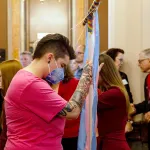Charlotte Clymer, LGBTQ+ activist and former rapid response Human Rights Campaign press secretary, will be the first transgender person to join the board of the LPAC, a Super PAC founded by lesbians, the group’s executive director Lisa Turner told The 19th.
LPAC, a hybrid PAC/super PAC that can fundraise directly for candidates and accept unlimited contributions for ads or other election messaging, has raised roughly $6 million over the last few years as it funds LGBTQ+ women running for office and Democratic candidates who support LGBTQ+ rights.
Its largest single-year haul since its 2012 founding came in 2016, when the organization raised $2 million and spent nearly that much in the election cycle, putting the most cash behind Democrats with federal campaigns in a single year to date, according to OpenSecrets data.
Clymer joins the Super PAC as political rhetoric surrounding trans people has reached new heights, through a record number of statehouse bills targeting trans youth plus efforts to ban books and curb sports access in schools.
She also joins the organization as it works to understand how voters are responding to transgender issues. LPAC recently undertook its first national survey, alongside Lake Research Partners, to explore how voters feel about trans issues such as access to youth sports and gender-affirming care.
Some of the data collected in the survey of 800 registered voters, plus voters in swing congressional districts, could give LPAC an opportunity to target young Republicans on trans issues, Lake Research President Celinda Lake told LPAC board members in a research briefing earlier this month.
Lake, who polled for Biden’s presidential campaign and according to Axios still advised the president’s team as of this summer, said that cracks in the Republican base on trans issues could present an opportunity to win over some swing voters on trans rights.
The online October survey found that young Republicans were more positive than older Republicans in response to politicians who support trans rights — one signal that the party base has diverse views on an issue that has become a rallying cry for Republican state lawmakers across the country.
“I think it challenges conventional wisdom a bit,” Cate Gormley, the vice president at Lake Research Partners who helped lead the survey, said of the insights on Republican voters.
Another question in the survey asked for voters’ likelihood to cast their ballot for a candidate who stood up for transgender rights and inclusivity. Again, Republicans were split along age lines.
“I think there’s this idea out there that the electorate is pretty negative or not looking for their leaders to be supporting transgender people. And you know, on these two questions, we don’t find that to be the overwhelming attitude among Republicans,” Gormley told The 19th.
While LPAC has not endorsed a Republican candidate in the past, the organization has endorsed some independents and Libertarians, political director Matt Fouracre said. So far, although LPAC has considered supporting assorted Republican candidates, it has opted not to because they have not been fully aligned on issues including trans rights and reproductive health, he said.
Nearly all anti-bills introduced this year, the majority of which aimed to keep K-12 trans students out of sports that match their gender identity and ban gender-affirming care for trans youth, were introduced or sponsored by Republican lawmakers. Former President Trump stoked the rhetoric behind some of the bills at the conservative CPAC conference earlier this year.
While polling from the Public Religion Research Institute finds that support for laws that protect LGBTQ+ from discrimination are strongly bipartisan, stronger differences form when voters are asked about specific policies, like allowing trans students to join school sports.
LPAC and Lake Research Partners’ survey found similar pressure on voters when asked about support for specific policies restricting trans rights vs. overall support for discrimination protections. Nearly the same number of voters supported anti-discrimination laws for trans people and requiring trans students to play on teams that match their sex assigned at birth.
The survey also found that African American voters were the most likely of other racial demographics to know someone who is transgender — 47%, compared to 30% of White people. 51% of people under 30 said they know someone trans. Pew Research found earlier this year that a growing number of Americans know someone who is trans, which some pollsters and advocates believe can indicate a stronger willingness to support trans rights.
Turner said the organization became interested in researching how voters respond to trans issues in 2020, after Gina Ortiz Jones — then a Texas congressional candidate — was subjected to anti-trans attacks. (She is now the under secretary of the Navy.) The urge to do something was doubled after Trump advocated for trans women to be banned from women’s sports at CPAC, she said.
The discrimination that trans people face, and the deeper inequalities that keep many trans people of color from gaining financial and political power, are reasons trans visibility matters, especially in the corridors of power, Clymer said.
“It’s more important than ever” to advocate for trans women and get them into political office, she said. “This is the deadliest year on record for trans people. … It’s very important for traditional LGBTQ spaces to ensure that they’re being intentional about the work and LPAC is showing that.”
Ahead of the 2022 midterms, LPAC has spent about $147,000 on Democrats’ federal campaigns, per OpenSecrets, and has made almost $14,000 in contributions to state and local candidates, Fouracre said. The organization has also raised an additional $80,000 for federal, state and local candidates this year, he said, and raised money through its 501(c)(3) and 501(c)(4) nonprofit groups.
In this year’s election cycle, LPAC endorsed five transgender candidates — including Andrea Jenkins, the first Black trans woman to be elected in the United States,who won her reelection, and Mariah Moore, a Black trans woman who ran this year for New Orleans’ City Council and lost in the city’s runoff election, Fouracre said.
LPAC endorsed 11 transgender candidates in 2020, Turner said, and the first trans candidate the orgnaization ever endorsed was Virginia Del. Danica Roem, the first out trans person to be elected and serve in a state legislature, in 2017.
Trans people are gravely underrepresented in elected office, and those who make it into positions of power are usually White. Jenkins previously told The 19th that many trans people aren’t able to think about running for office while experiencing housing insecurity or homelessness, or while facing the threat of being killed during the most violence year on record for trans people.
Clymer said that as she joins LPAC’s board, one area of focus is figuring out how the PAC can specifically support trans nonbinary people of color — especially because White trans people are usually in positions of power, while trans people of color face the most violence.
“Something that bothers me though, is with all the barriers being broken, White trans women are getting a lot of attention,” she said. “But the bulk of violence and discrimination in this country right now against trans people are primarily being experienced by trans nonbinary folks of color and specifically, Black trans nonbinary people.”
Reconciling that power disparity while working to support trans candidates is tough, she said, but increasing representation of Black and nonbinary trans people was brought up in discussions with LPAC before joining the board.
“I joined LPAC because I want to support queer women generally,” Clymer said. “I think we need more queer women of all backgrounds in elected office and at the highest levels of government. And part of that of course, as a trans woman, is ensuring that our representation is increased.”
Correction: An earlier version of this article misstated LPAC's official name. The article also described incorrectly the way the organization raised $80,000 for federal, state and local candidates this year. The money was raised by LPAC supporters directly to candidates, not raised through LPAC's nonprofit groups.







